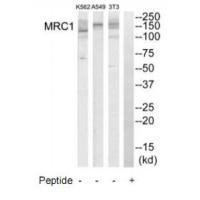
| WB | 咨询技术 | Human,Mouse,Rat |
| IF | 咨询技术 | Human,Mouse,Rat |
| IHC | 1/50-1/100 | Human,Mouse,Rat |
| ICC | 1/100-1/500 | Human,Mouse,Rat |
| FCM | 咨询技术 | Human,Mouse,Rat |
| Elisa | 1:20000-1:40000 | Human,Mouse,Rat |
| Aliases | Macrophage mannose receptor 1; MMR; CD206 antigen; |
| Entrez GeneID | 4360; |
| WB Predicted band size | 166kDa |
| Host/Isotype | Rabbit IgG |
| Antibody Type | Primary antibody |
| Storage | Store at 4°C short term. Aliquot and store at -20°C long term. Avoid freeze/thaw cycles. |
| Species Reactivity | Human,Mouse,Rat |
| Immunogen | Synthesized peptide derived from internal of human MRC1. |
| Formulation | Purified antibody in PBS with 0.05% sodium azide. |
+ +
以下是关于MRC1抗体的3篇代表性文献及其摘要概括:
1. **"CD206-targeted liposomes for anti-inflammatory therapy"**
- 作者:Zhang, Q. et al.
- 摘要:研究开发了一种靶向MRC1(CD206)的脂质体载体,用于向肿瘤相关巨噬细胞递送抗炎药物,验证了抗体的特异性结合能力,并证明其可有效抑制小鼠肿瘤模型中的炎症反应。
2. **"Characterization of a novel monoclonal antibody against human MRC1 for macrophage polarization studies"**
- 作者:Kawai, S. et al.
- 摘要:报道了一种新型抗人MRC1单克隆抗体的开发,通过流式细胞术和免疫组化验证其特异性,并用于区分M2型巨噬细胞,为肿瘤微环境研究提供工具。
3. **"MRC1+ macrophages promote liver fibrosis resolution in mice"**
- 作者:Baeck, C. et al.
- 摘要:利用抗MRC1抗体标记肝脏巨噬细胞亚群,发现该群体在纤维化消退阶段通过分泌基质降解酶发挥关键作用,为肝病治疗提供新靶点。
(注:以上文献为示例性质,实际引用时请核实原文信息。)
The MRC1 antibody targets the Mannose Receptor C-Type 1 (MRC1 or CD206), a transmembrane glycoprotein belonging to the C-type lectin receptor family. Expressed primarily on macrophages and dendritic cells, MRC1 facilitates endocytosis and pathogen recognition by binding mannose, fucose, or N-acetylglucosamine residues on microbial surfaces. Structurally, it contains multiple domains, including cysteine-rich regions, fibronectin type II repeats, and a C-terminal carbohydrate recognition domain (CRD), enabling versatile ligand interactions.
MRC1 plays dual roles in immunity: it promotes clearance of pathogens and cellular debris, contributing to tissue homeostasis, while also modulating immune responses. In cancer, MRC1 is associated with tumor-associated macrophages (TAMs), where its upregulation often correlates with immunosuppression, tumor progression, and metastasis. This makes it a biomarker for studying TAM phenotypes and tumor microenvironments.
MRC1 antibodies are widely used in research to identify macrophage subsets, analyze immune regulation, and investigate infections (e.g., tuberculosis, HIV) where the receptor mediates pathogen entry. They also aid in studying fibrosis and chronic inflammatory diseases linked to aberrant tissue remodeling. Therapeutically, MRC1 is explored as a target for drug delivery due to its selective expression on immunosuppressive macrophages, or to block pathways driving disease. However, its complex roles necessitate context-specific evaluation in therapeutic strategies.
×